Related Research Articles

Harold Forster Chapin was an American singer-songwriter, philanthropist, and hunger activist best known for his folk rock and pop rock songs. He achieved worldwide success in the 1970s. Chapin, a Grammy Award-winning artist and Grammy Hall of Fame inductee, has sold over 16 million records worldwide.
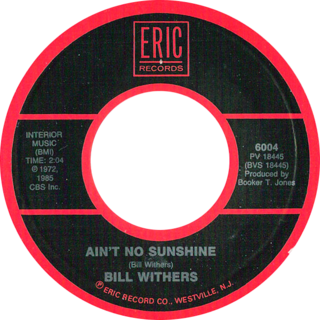
"Ain't No Sunshine" is a song by Bill Withers from his 1971 album Just As I Am, produced by Booker T. Jones. The record featured musicians Donald "Duck" Dunn on bass guitar, Al Jackson Jr. on drums and Stephen Stills on guitar. String arrangements were done by Booker T. Jones. The song was recorded in Los Angeles, with overdubs in Memphis by engineer Terry Manning.

"Cat's in the Cradle" is a 1974 folk rock song by Harry Chapin from the album Verities & Balderdash. The single topped the US Billboard Hot 100 in December 1974. As Chapin's only number-one song, it became the best known of his work and a staple for folk rock music. Chapin's recording of the song was nominated for the 1975 Grammy Award for Best Male Pop Vocal Performance and was inducted into the Grammy Hall of Fame in 2011.
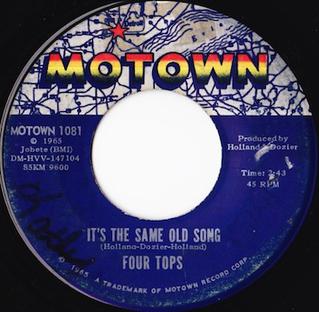
"It's the Same Old Song" was recorded by the Four Tops for the Motown label. It was released in 1965 as the second single from their second album. Written and produced by Motown's main production team Holland–Dozier–Holland, the song is today one of The Tops' signatures, and was reportedly created—from initial concept to commercial release—in 24 hours. It reached #5 on the Billboard Hot 100 and #2 on the Billboard R&B chart. It also reached #34 in the UK.

"Piano Man" is a song written and performed by American singer-songwriter Billy Joel. As his first single in North America, it was included on Joel's 1973 album of the same name and later released as a single on November 2, 1973. The song is sung from Joel's point of view as a piano player at a bar, reminiscing about his experiences there and the people he encountered. "Piano Man" is based on Joel's real-life experiences as a lounge musician in Los Angeles from 1972 to 1973, which he had decided to pursue in an effort to escape his contracted New York City-based record company at the time, Family Productions, following the poor commercial performance of the album Cold Spring Harbor. Joel describes various characters, including a bartender named John and a "real estate novelist" named Paul, all based on real-life individuals.

"Venus" is a song by Dutch rock band Shocking Blue, released as a single in the Netherlands in the summer of 1969. Written by Robbie van Leeuwen, the song topped the charts in nine countries.

"Atomic" is a song by American rock band Blondie from their fourth studio album, Eat to the Beat (1979). Written by Debbie Harry and Jimmy Destri and produced by Mike Chapman, the song was released in February 1980 as the album's third single.

"Love Is Here and Now You're Gone" is a 1967 song recorded by the Supremes for the Motown label.

KC and the Sunshine Band is the second studio album by KC and the Sunshine Band. The record was produced by Harry Wayne Casey and Richard Finch and was released in July 1975 on the TK label.

"I've Been Loving You Too Long" (originally "I've Been Loving You Too Long (To Stop Now)") is a soul music ballad written by Otis Redding and Jerry Butler. Considered by music critics and writers to be one of Redding's finest performances and a soul classic, it is a slow, emotional piece with Redding's pleading vocals backed by producer Steve Cropper's arpeggiated guitar parts and a horn section.
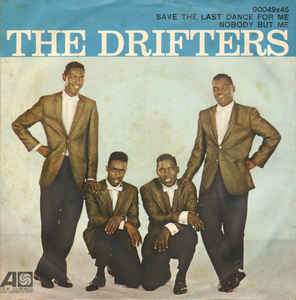
"Save the Last Dance for Me" is a song written by Doc Pomus and Mort Shuman, first recorded in 1960 by American musical group the Drifters with Ben E. King on lead vocals. It has since been covered by several artists, including Dalida, the DeFranco Family, Emmylou Harris, Dolly Parton, and Michael Bublé.

"If You Don't Know Me by Now" is a song written by Kenny Gamble and Leon Huff, and recorded by the Philadelphia soul musical group Harold Melvin & the Blue Notes. It became their first hit after being released as a single in September 1972, topping the US R&B chart and peaking at number 3 on the US Billboard Hot 100.
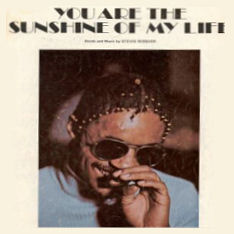
"You Are the Sunshine of My Life" is a 1973 single released by Stevie Wonder. The song became Wonder's third number-one single on the Billboard Hot 100 chart and his first number-one on the Easy Listening chart. It won Wonder a Grammy Award for Best Male Pop Vocal Performance, and was nominated for both Record of the Year and Song of the Year. This song was the second single released from the 1972 album entitled Talking Book, which stayed at number one on the R&B albums chart for three weeks.
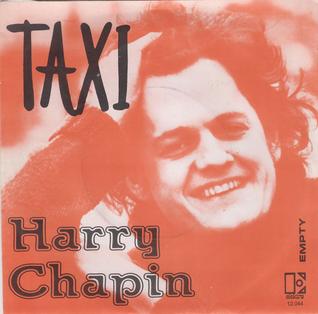
"Taxi" is a song written by Harry Chapin, released as a single in early 1972 to coincide with the release of his album Heads & Tales. It is an autobiographical ballad using first-person narrative to tell the story of a taxi cab driver meeting an old flame from his youth when he picks her up in his cab.

"I'm Your Boogie Man" is a song written and produced by Harry Wayne Casey and Richard Finch, and performed by Casey's band KC and the Sunshine Band, from their fourth album Part 3 (1976).

This article contains information about albums and singles released by the American musical duo Ike & Tina Turner.

"Song Sung Blue" is a 1972 hit song written and recorded by Neil Diamond, inspired by the second movement of Mozart's Piano Concerto #21. It was released on Diamond's album Moods, and later appeared on many of Diamond's live and compilation albums. The song was a #1 hit on the Billboard Hot 100 chart in the United States for one week, the week of July 1, and it spent twelve weeks in the Top 40. It also reached #14 on the UK Singles Chart.

"Automatically Sunshine" is a song written by Smokey Robinson and released as a single by Motown singing group The Supremes as the second single from their popular album Floy Joy in 1972.

"Never My Love" is a pop standard written by American siblings Don and Dick Addrisi, and best known from a hit 1967 recording by the Association. The Addrisi Brothers had two Top 40 hits as recording artists, but their biggest success as songwriters was "Never My Love". Recorded by dozens of notable artists in the decades since, in 1999 the music publishing rights organization Broadcast Music, Inc. (BMI) announced it was the second most-played song on radio and television of the 20th century in the U.S.

"The Right Thing to Do" is a song written and performed by Carly Simon that first appeared on her 1972 album No Secrets. The song was recorded at Trident Studios in London's Soho. It was released as the second single to the album, following "You're So Vain" and reached No. 17 on the Billboard Hot 100 and No. 4 on Billboard's Adult Contemporary chart. It also reached No. 20 on the Canada Top Singles chart and No. 9 on the Canadian Adult Contemporary chart. It reached No. 17 in the UK.
References
- ↑ "CashBox Record Reviews" (PDF). Cash Box. October 7, 1972. p. 21. Retrieved 2021-12-11.
- ↑ "Hits of the Week" (PDF). Record World. October 7, 1972. p. 1. Retrieved 2023-03-29.
- 1 2 3 "Harry Chapin Wiki". Anyoldkindofday.com. Archived from the original on 2018-04-02. Retrieved February 16, 2023.
- ↑ "Billboard, Sunday Morning Sunshine". Billboard.com. Retrieved February 3, 2020.
- ↑ "Billboard, Sunday Morning Sunshine". Billboard.com. Retrieved February 3, 2020.
- ↑ "Cashbox, 1970-1979" (PDF). Myweb.tiscali.co.uk. Retrieved February 3, 2020.
- ↑ "RPM Top 100 Singles - December 9, 1972" (PDF).
- ↑ "1972 Year End". Bullfrogspond.com. Retrieved February 3, 2020.
- ↑ "The Swinging Blue Jeans - Sunday Morning Sunshine". 45cat.com.